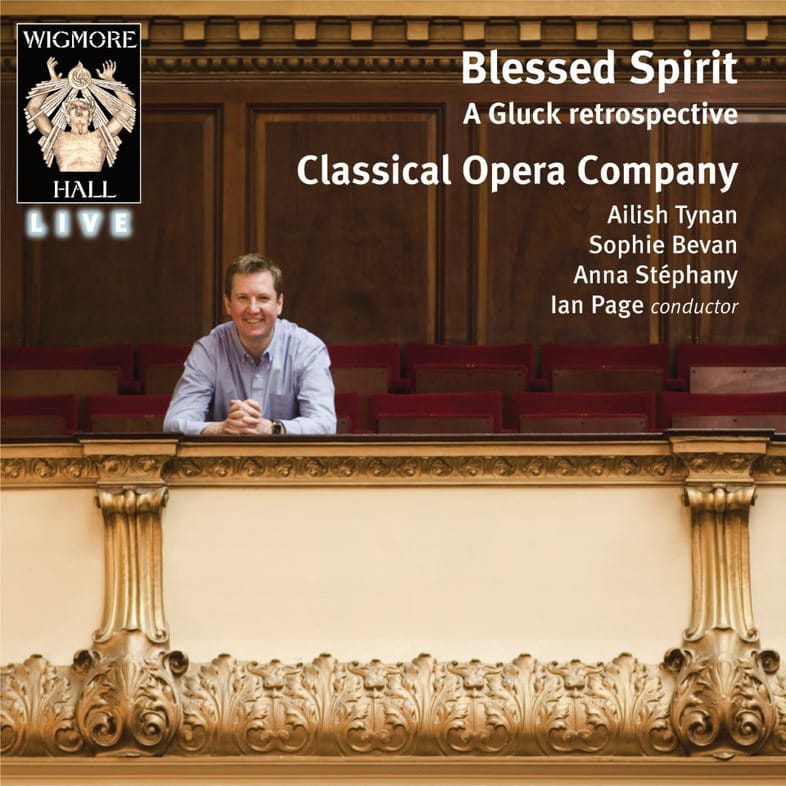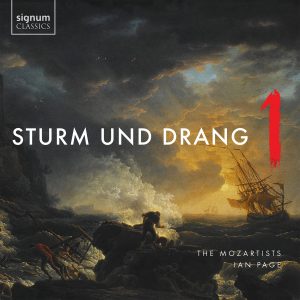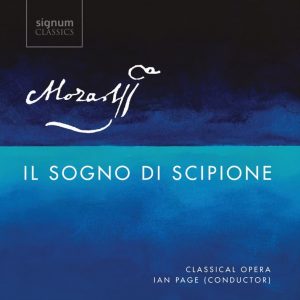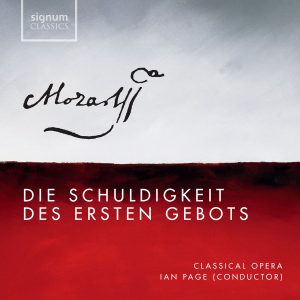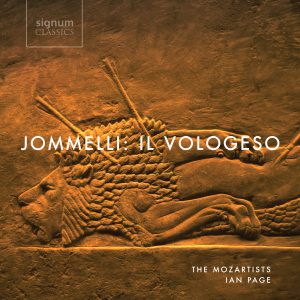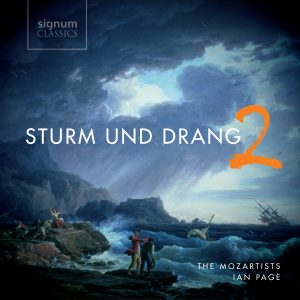CD 1
- Aria: “Il Ciel mi vuol oppresso” from La Semiramide riconosciuta 4:42
- Aria: “Se povero il ruscello” from Ezio 8:07
- Aria: “Se mai senti spirarti sul volto” from La clemenza di Tito 10:24
- Recitative: “Berenice, che fai?” from Antigono 4:32
- Aria: “Perché, se tanti siete” from Antigono 3:48
- Recitative: “Ombre tacite e chete” from Telemaco 2:32
- Aria: “Dall’ orrido soggiorno” from Telemaco 3:03
- Recitative: “Elisa? Aminta? É sogno?” from Il re pastore 1:14
- Duet: “Vanne a regnar, ben mio” from Il re pastore 5:56
- Aria: “Non jamais un tel époux” from L’ivrogne corrigé 2:46
- Recitative: “Qual vita e questa mai” from Orfeo ed Euridice 1:25
- Aria: “Che fiero momento” from Orfeo ed Euridice 2:42
- Recitative: “Ecco son nuovo tormento” from Orfeo ed Euridice 3:32
- Aria: “Che farò senza Euridice?” from Orfeo ed Euridice 3:34
- Recitative: “Figli, diletti figli!” from Alceste 2:41
- Aria: “Ah, per questo già stanco” from Alceste 4:38
- Aria: “O del mio dolce ardor” from Paride ed Elena 2:53
- Recitative: “Dieux puissants” from Iphégnie en Aulide 2:55
- Aria: “Jupiter, lance la foudre” from Iphigénie en Aulide 1:49
- Aria: “On s’étonnerait moins que la saison nouvelle” from Armide 3:36
- Introduction to encore 0.25
- Trio: “Ah, lo veggo” from Paride ed Elena 2:18
Christoph Willibald Gluck was one of the primary figures in the reform movement of opera in the third quarter of the eighteenth century. His work was based on “the immutable foundations of beauty and truth” (his own phrase), and his reforms sought to achieve dramatic and emotional verisimilitude through making the music serve the text. This represented a conscious attempt to replace the florid vocal excesses of the late Baroque with a return to the naturalistic and poetic origins of opera. “I sought to restrict music”, he wrote, “to its true purpose of expressing the poetry, and reinforcing the dramatic situation without interrupting the action or hampering it with superfluous embellishments”.
His three great ‘reform’ operas – Orfeo ed Euridice (1762), Alceste (1767) and Paride ed Elena (1770) – were written in collaboration with the librettist Calzabigi, and date from exactly the same period as that in which the young Mozart was writing his first operas. These were followed by a highly successful series of French operas (including the two Iphigénie operas and Armide) written for Paris. Gluck’s apprenticeship, though, had been an extensive one, and it comes as a surprise to many that by the time he came to write Orfeo ed Euridice he was already a veteran of over twenty-five operas. These were predominantly in the established Metastasian ‘opera seria’ style which his later reforms sought to replace, but the transition and development of his musical language was a gradual one, and many numbers from his early operas anticipate his later style.
The concert captured on this disc begins with an aria from Gluck’s first opera for Vienna, La Semiramide roconosciuta, a prestigious commission for the birthday celebrations of the Empress Maria Theresa in 1748. It is a setting of a libretto by Pietro Metastasio, the court poet in Vienna and the most celebrated librettist of the time. Part of the plot concerns Princess Tamiri, who had to choose a husband from three suitors. One of them, Ircano (originally sung by a castrato) tried to abduct Tamiri but failed and is taken prisoner. In “Il Ciel mi vuol oppresso” Ircano swears vengeance.
“Se povero il ruscello”, from Ezio, became much better known when Gluck reused the music for “Che puro Ciel” in Orfeo ed Euridice. Here it is sung by Massimo, who expresses his concern that the Roman general Ezio is becoming too powerful. In this simile aria he warns the Emperor Valentiniano that the gently flowing stream can swell and burst its banks if they are not strong enough to restrain it.
Gluck’s La clemenza di Tito created a sensation at its premiere in Naples in 1752, where the unconventional harmonies and orchestration of the aria “Se mai senti spirarti sul volto” set heads shaking in disbelief. It was sung by the celebrated castrato Caffarelli in the role of Sesto, who, sentenced to death, sings this heartfelt farewell to his beloved Vitellia.
Like Bach and Handel, Gluck was an inveterate recycler of his own music and “Se mai senti spirarti sul volto” appeared again in 1779 in Iphigénie en Tauride. The aria “Perché, se tanti siete” was obviously another of Gluck’s favourites, for he reused it in Telemaco and again in Iphigénie en Tauride. The original – which owes more than a little to the Gigue from J.S. Bach’s Partita No. 1 in B flat major – comes from Antigono, shortly after whose premiere in Rome in 1756 Gluck was rewarded with a knighthood – Cavaliere dello Sperone d’Oro. Thereafter he always signed himself ‘Cavaliere’, ‘Chevalier’ or ‘Ritter’ Gluck.
Berenice is betrothed to Antigono but is actually in love with his son Demetrio, who at the end of the opera sees death as the only way out of the ghastly situation. In the final scene Berenice bewails her fate and looks forward to joining Demetrio in death.
Telemaco is an intriguing work, coming as it does between the two mighty pillars of Orfeo and the Italian Alceste. It is one of Gluck’s most compelling operatic experiments, and the role of the sorceress Circe was to exercise a profound influence on the character of Armide. Indeed, Gluck reused some of the music from Telemaco in that later opera, including the aria “Dall’ oriddo soggiorno”, which creates an awe-inspiring effect as Circe summons her evil spirits to attack Telemachus.
Il re pastore was another libretto by Metastasio, later set by Mozart. In this scene at the end of the first act the shepherd Aminta has just discovered that he is the rightful king of Phoenicia, and in the duet he and his girlfriend Elisa swear eternal fidelity despite the testing times ahead.
Gluck’s opéras-comiques are among the most neglected of his stage works, and it usually comes as a surprise that the great operatic reformer and composer of profoundly serious operas and psychological dramas could turn his hand to lighter entertainment so skilfully. The French opéra-comique was an entertainment which had been introduced at the Viennese court in the 1750s, partly as a result of the recent political rapprochement between Austria and France. Gluck’s 1760 setting of L’ivrogne corrigé (‘The drunked reformed’) includes a kind of tongue-in-cheek anticipation of Orfeo ed Euridice where the drunkard in question imagines that he is in Hades being tormented by the Furies, whereas in reality he is hallucinating in a wine cellar. The tender aria “Non jamais un tel époux” is sung by Colette, who is determined to marry her lover rather than his drinking partner to whom she has been promised.
The premiere of Orfeo ed Euridice in Vienna in 1762 was a milestone in the history of opera, and it has remained Gluck’s most celebrated work. This scene from the third act takes place as Orpheus is leading Eurydice back from the underworld. He is overcome by her anxiety and, forgetting his promise to the gods, he turns to look at her. She dies and he sings the famous impassioned lament, “Che farò senza Euridice” (here performed at an alla breve tempo as prescribed by Gluck).
It was with Alceste, first performed in Vienna in 1767, that Gluck and his librettist Ranieri de’ Calzabigi nailed their reformist principles to the mast, publishing a manifesto in the score the opera outlining their aims. The almost unrelievedly tragic plot concerns Alceste, the wife of King Admetus of Thebes, who volunteers to sacrafice her own life to prevent her husband’s death. This subject and its text were calculated to reflect recent events: the death of Maria Theresa’s consort and her fortitude in her grief. Alceste was even referred to as a ‘Seelenmesse’ (‘Requiem mass’). In this heart-rending scene at the end of the second act the distraught heroine bids an anguished farewell to her children,
Paride ed Elena also has a libretto by Calzabigi, but in contract to their previous collaborations the subject of Paride is sexual passion. In the aria “O del mio dolce ardor” from the opera’s first act Paris has just landed on the shore of Sparta, impatient to see for the first time the object of his adoration, the fabled Helen.
Gluck was nearly sixty when he travelled to Paris in 1773 to begin the rehearsals for Iphigénie en Aulide, his first opera for the French capital. As he himself observed, ‘the enterprise is certainly a bold one, and there will be considerable opposition’, so Gluck, ever the pragmatist, enlisted the support of his former pupil Marie-Antoinette. In this scene from the third act of the opera, Clytemnestra despairs over the imminent sacrafice of her daughter Iphigenia and rails against the implacable gods, exhorting Jupiter to destroy the Greek fleet.
Iphigénie en Aulide was a colossal triumph, and Gluck followed it with further operas for Paris, French versions of Orfeo and Alceste as well as newly composed works including Iphigénie en Tauride and Armide. In this opera he at once confronted and paid homage to French Baroque opera by using the same libretto that Lully had set for his Armide ninety years earlier.
Gluck referred to Armide as ‘perhaps the best of my operas’, one that must ‘arouse a voluptuous sensation’. The eponymous heroine, the pagan sorceress who seduces the crusader Renaud away from the path of duty, is one of Gluck’s most fascinating creations. In the second act ‘On s’étonnerait moins que la saison nouvelle’ is sung by a shepherdess as part of the divertissement conjured up by Armide to lull Renaud to sleep in an enchanted woodland grove.
As an encore Ian Page returned to Paride ed Elena for the brief trio from the fourth act, in which Paris is continuing his suit of Helen, so far to no avail, watched over by the scheming Cupid.
Notes by Jeremy Hayes © 2010

